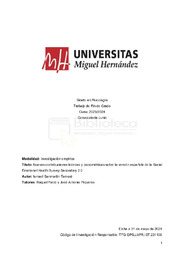Por favor, use este identificador para citar o enlazar este ítem:
https://hdl.handle.net/11000/32493Registro completo de metadatos
| Campo DC | Valor | Lengua/Idioma |
|---|---|---|
| dc.contributor.advisor | Falcó, Raquel | - |
| dc.contributor.advisor | Piqueras, José Antonio | - |
| dc.contributor.author | Sanmartín Tamará, Ismael | - |
| dc.contributor.other | Departamentos de la UMH::Psicología de la Salud | es_ES |
| dc.date.accessioned | 2024-07-17T08:29:46Z | - |
| dc.date.available | 2024-07-17T08:29:46Z | - |
| dc.date.created | 2024-06 | - |
| dc.identifier.uri | https://hdl.handle.net/11000/32493 | - |
| dc.description.abstract | Cada vez más autores abogan por un cambio de paradigma que equilibre la atención y el abordaje del bienestar y malestar psicológico. En este contexto, el modelo de covitalidad cobra relevancia, ya que la codisposición y sinergia de autoesquemas inter/intrapersonales positivos favorece el ajuste psicosocial y previene los problemas de salud mental en la adolescencia. Así, el objetivo de este estudio fue validar la versión española de la Social Emotional Health Survey-Secondary 2.0 (SEHS-S 2.0), aportando nuevos datos teóricos y psicométricos con una muestra de 5.528 adolescentes (Medad = 14,20 años, DT= ± 1,53). Los análisis factoriales confirmatorios respaldaron la estructura jerárquica original, obteniendo además altos índices de fiabilidad. La invarianza factorial se confirmó en edades, sexos y temporalidad. Se observaron diferencias significativas en las fortalezas psicosociales según sexo y edad. Los análisis de validez concurrente mostraron relaciones positivas con el bienestar subjetivo y la calidad de salud, y negativas con problemas emocionales, conductuales, distrés psicológico y conducta suicida. Un análisis de red mostró fuertes conexiones entre los nodos de covitalidad, predominando una distribución intradominio. Se aportaron datos normativos del SEHS-S 2.0. La validación de este instrumento proporciona una medida valiosa en la evaluación de fortalezas psicosociales. | es_ES |
| dc.description.abstract | An increasing number of authors advocate for a paradigm shift that balances attention and approaches to psychological well-being and distress. In this context, the concept of covitality becomes relevant, as the co-disposition and synergy of positive inter/intrapersonal selfschemas promote psychosocial adjustment and prevent mental health problems in adolescence. Thus, the aim of this study was to validate the Spanish version of the Social Emotional Health Survey-Secondary 2.0 (SEHS-S 2.0), providing new theoretical and psychometric data with a sample of 5,528 adolescents (Mean age = 14.20 years, SD = ± 1.53). Confirmatory factor analyses supported the original hierarchical structure, yielding high reliability indices. Factorial invariance was confirmed across age, gender, and time. Significant differences in psychosocial strengths were observed according to gender and age. Concurrent validity analyses showed positive relationships with subjective well-being and health quality, and negative relationships with emotional, behavioral, psychological distress, and suicidal behavior problems. A network analysis revealed strong connections among covitality nodes, with an intra-domain distribution predominating. Normative data for the SEHS-S 2.0 were provided. The validation of this instrument provides a valuable measure in assessing psychosocial strengths. | es_ES |
| dc.format | application/pdf | es_ES |
| dc.format.extent | 41 | es_ES |
| dc.language.iso | spa | es_ES |
| dc.publisher | Universidad Miguel Hernández de Elche | es_ES |
| dc.rights | info:eu-repo/semantics/openAccess | es_ES |
| dc.rights.uri | http://creativecommons.org/licenses/by-nc-nd/4.0/ | * |
| dc.subject | covitalidad | es_ES |
| dc.subject | adolescentes | es_ES |
| dc.subject | salud mental positiva | es_ES |
| dc.subject | social and emotional health | es_ES |
| dc.subject | survey-secondary | es_ES |
| dc.subject | medida | es_ES |
| dc.subject | covitality | es_ES |
| dc.subject | adolescents | es_ES |
| dc.subject | positive mental health | es_ES |
| dc.subject | measurement | es_ES |
| dc.subject.other | CDU::1 - Filosofía y psicología::159.9 - Psicología | es_ES |
| dc.title | Nuevas contribuciones teóricas y psicométricas sobre la versión española de la Social Emotional Health Survey-Secondary 2.0 | es_ES |
| dc.type | info:eu-repo/semantics/bachelorThesis | es_ES |

Ver/Abrir:
TFG - ISMAEL SANMARTIN TAMARA.pdf
1,2 MB
Adobe PDF
Compartir:
 La licencia se describe como: Atribución-NonComercial-NoDerivada 4.0 Internacional.
La licencia se describe como: Atribución-NonComercial-NoDerivada 4.0 Internacional.
Herramientas de Administrador
.png)